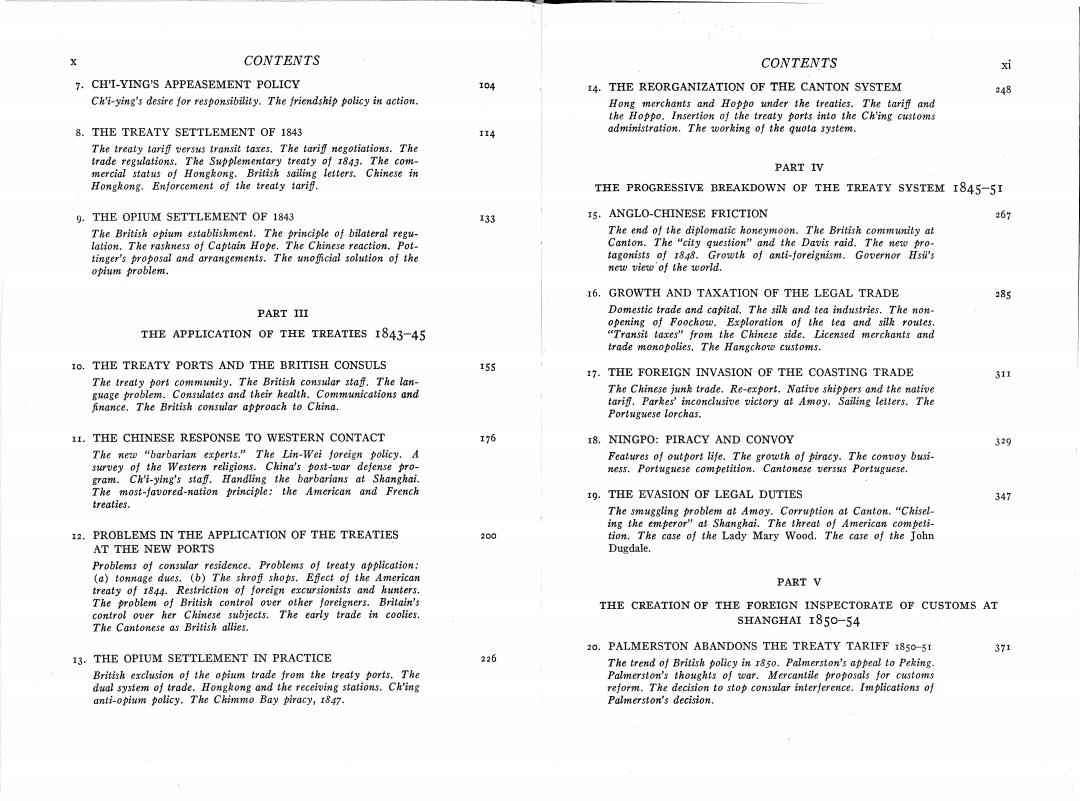正在加载图片...

CONTENTS CONTENTS 7.CH'I-YING'S APPEASEMENT POLICY 104 14.THE REORGANIZATION OF THE CANTON SYSTEM 24 Ch'i-ying's desire for responsibility.The friendship policy in action. Hong merchants and Hoppo under the treaties.The tarif and the Hoppo.Insertion of the treaty ports into the Ck'ing customs 8.THE TREATY SETTLEMENT OF 1843 114 administration.The working of the quota system. The treaty tariff versus transit taxes.The tarif negotiations.The trade regulations.The Supplementary treaty of 1843.The com- mercial status of Hongkong.British sailing letters.Chinese in PART IV Hongkong.Enforcement of the treaty tarif. THE PROGRESSIVE BREAKDOWN OF THE TREATY SYSTEM I845-51 9.THE OPIUM SETTLEMENT OF 1843 I33 15.ANGLO-CHINESE FRICTION 267 The British opium establishment.The principle of bilateral regu- The end of the diplomatic honeymoon.The Britisk community at lation.The rashness of Captain Hope.The Chinese reaction.Pot- Canton.The "city question"and the Davis raid.The new pro- tinger's proposal and arrangements.The unoficial solution of the tagonists of 1848.Growth of anti-foreignism.Governor Hsil's opium problem. new view of the地orld. 16.GROWTH AND TAXATION OF THE LEGAL TRADE 285 PART III Domestic trade and capital.The silk and tea industries.The non- opening of Foochow.Exploration of the tea and silk routes. THE APPLICATION OF THE TREATIES 1843-45 Transit taxes"from the Chinese side.Licensed merchants and trade monopolies.The Hangchow customs. Io.THE TREATY PORTS AND THE BRITISH CONSULS 155 17.THE FOREIGN INVASION OF THE COASTING TRADE The treaty port community.The Britisk consular staf.The lan- guage problem.Consulates and their health.Communications and The Chinese junk trade.Re-export.Native shippers and the native finance.The British consular approach to China. tarif.Parkes'inconclusive victory at Amoy.Sailing letters.The Portuguese lorchas. 11.THE CHINESE RESPONSE TO WESTERN CONTACT 176 18.NINGPO:PIRACY AND CONVOY 329 The new "barbarian experts."The Lin-Wei foreign policy.A Features of outport life.The growth of piracy.The convoy busi- survey of the Western religions.China's post-war defense pro- ness.Portuguese competition.Cantonese versus Portuguese. gram.Ch'i-ying's staf.Handling the barbarians at Shanghai. The most-favored-nation principle:the American and Frenck 19.THE EVASION OF LEGAL DUTIES 347 treaties. Tke smuggling problem at Amoy.Corruption at Canton."Chisel- ing the emperor"at Shanghai.The threat of American competi- 12.PROBLEMS IN THE APPLICATION OF THE TREATIES 200 tion.The case of the Lady Mary Wood.The case of the John AT THE NEW PORTS Dugdale. Problems of consular residence.Problems of treaty application: (a)tonnage dues.(b)The shroff shops.Efect of the American PART V treaty of 1844.Restriction of foreign excursionists and hunters. The problem of British control over other foreigners.Britain's THE CREATION OF THE FOREIGN INSPECTORATE OF CUSTOMS AT control over her Chinese subjects.The early trade in coolies. The Cantonese as Brilish allies. SHANGHAI I850-54 2o.PALMERSTON ABANDONS THE TREATY TARIFF 185o-51 371 13.THE OPIUM SETTLEMENT IN PRACTICE 226 The trend of British policy in 1850.Palmerston's appeal to Peking. British exclusion of the opium trade from the treaty ports.The Palmerston's thoughts of war.Mercantile proposals for customs dual system of trade.Hongkong and the receiving stations.Ch'ing reform.The decision to stop consular interference.Implications of anti-opium policy.The Chimmo Bay piracy,1847. Palmerston's decision.x CONTENTS 7. CH'I-YING'S APPEASEMENT POLICY Ch'i-ying's desire for responsibility. The friendship policy in action. 8. THE TREATY SETTLEMENT OF 1843 The treaty tariff versus transit taxes. The tariff negotiations. The trade regulations. The Supplementary treaty of 1843. The commercial status of Hongkong. British sailing letters. Chinese in H ongkong. Enforcement of the treaty tariff. 9. THE OPIUM SETTLEMENT OF 1843 The British opium establishment. The principle of bilateral regulation. The rashness of Captain Hope. The Chinese reaction. Pottinger's proposal and arrangements. The unofficial solution of the opium problem. PART III THE APPLICATION OF THE TREATIES 1843-45 10. THE TREATY PORTS AND THE BRITISH CONSULS The treaty port community. The British consular staff. The language problem. Consulates and their health. Communications and finance. The British consular approach to China. II. THE CHINESE RESPONSE TO WESTERN CONTACT The new "barbarian experts." The Lin-Wei foreign policy. A survey of the Western religions. China's post-war defense program. Ch'i-ying's staff. Handling the barbarians at Shanghai. The most-favored-nation principle: the American and French treaties. 12. PROBLEMS IN THE APPLICATION OF THE TREATIES AT THE NEW PORTS Problems of consular residence. Problems oj treaty application: (a) tonnage dues. (b) The shroff shops. Effect of the American treaty of 1844. Restriction of foreign excursionists and hunters. The problem of British control over other foreigners. Britain's control over her Chinese subjects. The early trade in coolies. The Cantonese as British allies. 13. THE OPIUM SETTLEMENT IN PRACTICE British exclusion of the opium trade from the treaty ports. The dual system of trade. Hongkong and the receiving stations. Ch'ing anti-opium policy. The Chimmo Bay piracy, 1847. 104 II4 133 155 200 CONTENTS 14. THE REORGANIZATION OF THE CANTON SYSTEM Hong merchants and Hoppo under the treaties. The tariff and the Hoppo. Insertion of the treaty ports into the Ch'ing customs administration. The working of the quota system. PART IV xi THE PROGRESSIVE BREAKDOWN OF THE TREATY SYSTEM 1845-51 IS. ANGLO-CHINESE FRICTION The end of the diplomatic honeymoon. The British community at Canton. The "city question" and the Davis raid. The new protagonists of 1848. Growth of anti-foreignism. Governor Hsu's new view' oj the world. 16. GROWTH AND TAXATION OF THE LEGAL TRADE Domestic trade and capital. The silk and tea industries. The nonopening of Foochow. Exploration of the tea and silk routes. "Transit taxes" from the Chinese side. Licensed merchants and trade monopolies. The Hangchow customs. 17. THE FOREIGN INVASION OF THE COASTING TRADE The Chinese junk trade. Re-export. Native shippers and the native tariff. Parkes' inconclusive victory at Amoy. Sailing letters. The Portuguese lorchas. 18. NINGPO: PIRACY AND CONVOY Features of outport life. The growth of piracy. The convoy business. Portuguese competition. Cantonese versus Portuguese. 19. THE EVASION OF LEGAL DUTIES The smuggling problem at Amoy. Corruption at Canton. "Chiseling the emperor" at Shanghai. The threat oj American competition. The case of the Lady Mary Wood. The case of the John Dugdale. PART V 3II 329 347 THE CREATION OF THE FOREIGN INSPECTORATE OF CUSTOMS AT SHANGHAI I850-54 20. PALMERSTON ABANDONS THE TREATY TARIFF 1850--5I The trend of British policy in I850. Palmerston's appeal to Peking. Palmerston's thoughts of war. Mercantile proposals for customs reform. The decision to stop consular interference. Implications of Palmerston's decision. 371